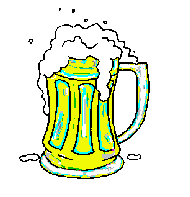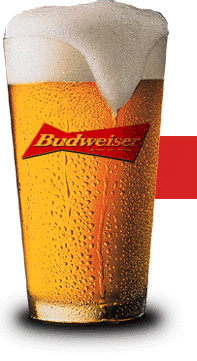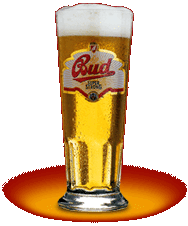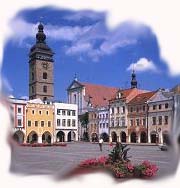 |
 |
 |
 |
 |
 |


![]()
![]() This issue involves United States of America and the Czech Republic.
For past hundred years, an international legal dispute continued between the American brewer
Anheuser-Busch and the Czech beer producer Budejovicky Budvar over the right to use
the trademark name Budweiser on their products. Currently, both of the brewers produce beer beverage labeled Budweiser, and battle over who does have the legal right to the commercial use of this name.
Both the brews have a long history of existence. The disagreements over the
right to use the trademark started in late 1870s, when the brewers began to export
their like-named products to markets beyond their national borders.
Attempting to legally win the exclusive right to the trademark use, the dispute has been taken to courts in different countries.
The results so far did not provide either party the exclusive right to the name, but rather resulted in
the division of market.
This issue involves United States of America and the Czech Republic.
For past hundred years, an international legal dispute continued between the American brewer
Anheuser-Busch and the Czech beer producer Budejovicky Budvar over the right to use
the trademark name Budweiser on their products. Currently, both of the brewers produce beer beverage labeled Budweiser, and battle over who does have the legal right to the commercial use of this name.
Both the brews have a long history of existence. The disagreements over the
right to use the trademark started in late 1870s, when the brewers began to export
their like-named products to markets beyond their national borders.
Attempting to legally win the exclusive right to the trademark use, the dispute has been taken to courts in different countries.
The results so far did not provide either party the exclusive right to the name, but rather resulted in
the division of market.
 The American and the Czech beer companies both claim to have the right to the name Budweiser.
Currently, there are two different beer brands both named Budweiser being brewed by different producers, and such situation is a source of obvious disagreements.
At the begining, the reasoning behind the dispute was that two beer beverages of similar type with the same name would be a source of confusion in the markets that both the brewers wished to target, and therefore only one should have the right to use it. Later, each of them, of course, believing in authenticity and better quality of its own product, expressed the "fear" of one party taking advantage of the other one's prestige. Lastly, since neither one managed to win the exclusive right to the use of name in general, respective law suits were filed in respective countries, markets of which were of interest to the brewers.
The rulings differ, and each of the parties were able to gain trademark rights in only some cases – thus the dispute did not win them exclusive rights, but led to the division of market.
The American and the Czech beer companies both claim to have the right to the name Budweiser.
Currently, there are two different beer brands both named Budweiser being brewed by different producers, and such situation is a source of obvious disagreements.
At the begining, the reasoning behind the dispute was that two beer beverages of similar type with the same name would be a source of confusion in the markets that both the brewers wished to target, and therefore only one should have the right to use it. Later, each of them, of course, believing in authenticity and better quality of its own product, expressed the "fear" of one party taking advantage of the other one's prestige. Lastly, since neither one managed to win the exclusive right to the use of name in general, respective law suits were filed in respective countries, markets of which were of interest to the brewers.
The rulings differ, and each of the parties were able to gain trademark rights in only some cases – thus the dispute did not win them exclusive rights, but led to the division of market.
Anheuser-Busch was founded by German immigrants, the American brewers say. Adolphus Busch (a German-born American beer brewer) adopted the name Budweiser in 1876. He is said to had thought it was a great idea to give the beer distinct and evocative name --Budweiser - that reminded him of his old country which already was well-known for its high quality beer products, and was also to be brewed in the same style the Czech/German lager-style beers were.5.
 The (then Czechoslovak) company named Budejovicky Budvar was founded in the town of Ceske Budejovice in 1895. The beer, however has been brewed in Budejovice ever since the 14th century.
The disputed "Budeweiser" name is an adjective originating from the German name
of the Czech town Ceske Budejovice – Budweis- where the beer was born in the Middle
Ages and thus describing the origin of the brew. Budweiser means the beer of the Budweis region, same as Champaign in France describes the wine of the Champaign wineries. Logically then, the Czechs claim to have the right to the name from long before the Americans even started the beer brewing.6.
The (then Czechoslovak) company named Budejovicky Budvar was founded in the town of Ceske Budejovice in 1895. The beer, however has been brewed in Budejovice ever since the 14th century.
The disputed "Budeweiser" name is an adjective originating from the German name
of the Czech town Ceske Budejovice – Budweis- where the beer was born in the Middle
Ages and thus describing the origin of the brew. Budweiser means the beer of the Budweis region, same as Champaign in France describes the wine of the Champaign wineries. Logically then, the Czechs claim to have the right to the name from long before the Americans even started the beer brewing.6.
The Czech brewer wished to start exporting its then already existing Budvar into the markets beyond those of the Old Continent but found out another Budweiser existed. Since Anheuser-Busch has already had the trademark registered in the United States, Budvar was temporarily sold in the US under a different name - Crystal. Similarly, the American brewer, also interested in expanding its market, but now aware of the other Budweiser's existence [and due to the disputes] would use the name -Bud –abroad to get around the issue. The disagreement, however, grew larger and later included also the right to the variations of the name Budweiser which includes the name Bud (which is, now , already produced by both brewers). Teoretically, the two companies were to honor agreements about avoiding the market dominated by the other party, but they have eventually engaged in a legal dispute over who should have the right to use the trademark.
Legal Cases
As an outcome of the above described events, a number of lawsuits were filed by Anheuser -Bush in order to restrict or ban the sale of Budvar. Later Budejovicky Budvar also engaged in the legal law suits, and and some sort of legal action was employed by one or the other party in several different countries. Although Anheuser-Busch still holds unchallenged rights to the Budweiser name in most of the world, including North and South America and virtually all of Asia.7, some of the decisions ruling in favor of the Czech brewer were upheld. Following are several examples for illustration:
Switzerland's Supreme Court ruled against American brew "Bud" beer in a dispute over the Budweiser and Bud names.American beer should not be sold as "Bud" in Switzerland because of a risk of confusion with the name "Budweiser," used by Czech brewer Budejovicky Budvar. Anheuser-Busch will sell its product under different name.7
Germany is one of the largest and most important economic partners for the Czechs. Czech Budweiser® has been registered and sold there for years, Ruzicka states. For that reason, the Anheuser-Bush had to sell its product under the name Anheuser-Busch B. Problems were created, however, when Anheuser-Busch used "Budweiser" in the commercial campaigns and advertising for its product. Budvar, protecting its German legally registered trademark, filled lawsuits to defend its rights.
Irish importer of Budvar is said to have terminated the import contract with Budvar as a consequence of demands for high financial compensation by Anheuser-Busch. Budvar is seeking to find different ways to distribute its product in Ireland.2
Czech Budweiser Budvar has been registered and sold as such in Norway since 1992. It was sold under both--Budvar and Budweiser--names. When Anheuser-Busch attempted to start exporting to Norway, Budvar believed this initiative to be an attempt of the Americans to push aside the Czech beer, while Anheuser -Busch felt that Budvar has been trying to prevent American producer form entering the Norwegian market and thus employed the legal means to pursue its goals.2.
Anheuser-Busch and Budejovicky Budvar have been battling in England since the 1970s. Recently, the Court of Appeal in London ruled that American brewery Anheuser-Busch and Czech brewery Budejovicky Budvar may both use the Bud and Budweiser name in England 4. England has thus recognized that both the brewers have the right to use both the trademarks.
American producer ,interested in the markets of these Baltic countries, filed alike law suits in both of them, asking for ban of Budweiser trademarks used by the Czechs. In both countries, however,the ruling was in favor of the Czech brewer, which (in Lithuania and Latvia) remains the exclusive importer of Budweiser Bier (and its variations). Anheuser-Busch is to use Anheuser-Busch B. label on its product in these countries.[Czech daily paper DNES. December 23, 1999].
The dispute had reached even Hong Kong when Anheuser-Bush took the
Budvar brewery to court to try to have the Czech-brewed Budejovicky Budvar
beer taken off Hong Kong store shelves. The American brewery alleged that
Budvar is infringing upon their copyright. The final decisions are not yet available.
Anheuser-Busch filed a complaint with the International Trade Commission charging the Czech Brewer with breaking the agreement form 1939 that forbids the Czech Budweiser form the US Market. Basis of Anheuser-Busch' accusations were allegations of the Czech beer being sold in the State of Maryland under the 'Budweiser Beer' label which , in the United States, belongs exclusively to Anheuser-Busch.
Czech brewer , in its defense, denied the accusations claiming to have always honored the 1939 Agreements. Only Budweiser Budvar beer exported to the United States is in the shipments for the Diplomatic Corps and Embassies ( only exception from the treaty) which are not a part of the American Jurisdiction nor constitute supply for American market. Consequently, the beer that was said to have been sold in the state of Maryland was alleged to have been imported by a third party, not supplied by the Czech Brewer. St. Louis' Anheuser-Busch has registered the Budweiser trademark in the United States in 1876, and since remains to have exclusive rights for the trademark in the US Market.
Blanka Homolova
Project Posting: May 8, 2000
Both American beer producer Anheuser Busch and Czech beer brewer Budejovicky Budvar have been producing beer beverages labeled Budweiser® and Bud® and thus been caught in a legal battle over the trademark ownership. Attempting to access new markets, a number of law suites have been filed in different countries. Some settlements have been made leading to the division of market.
Ever since the 1989, Anheuser Busch has also been trying to buy out some of the stock shares of the Budvar breweries, but the Czech Government decided to get involved in the industry privatization process. Later, Anheuser-Busch had proposed to purchase the Bud trademark [which had been used by both brewers as an alternative in the other countries to get around the issue of trademark ownership] from Budvar, but the Czech Ministry ceased negotiations on charges of Anheuser-Busch's bullying marketing tactics in the United States. Due to the refusal of the Czech Ministry to go through with the Bud deal, Anheuser-Busch slowly halted its hops purchases (from the Czechs), and beer analysts say that was a hardball tactic to make the Czechs give in (Mortkowitz). Anheuser-Busch offered to buy more hops in exchange for the Bud trademark.
Both the brews have their own international standing, and therefore it is unlikely that either one of the 'Buds' will give up (especially when one adds the international attention this dispute has won for both the companies). History of brewing in Ceske Budejovice dates to 1265, Anheuser-Busch registered its trademark in 1876 , after the Budweiser had been brewed there, but before the particular Budvar brewery was incorporated. Budvar, however, insists on the original Budweiser to remain as a reference to the beer brewed in Budweiss (German for Ceske Budejovice) –place of its (geographical) origin. In legal terms, therefore , this dispute involves not only intellectual property, but also touches on issues of rules of origin and also labeling.
Individual decisions were made on case-to-case basis, the dispute settlements led to market division. (See DESCRIPTION)
The legal dispute between the Czech brewer Budejovicky Budvar and American beer producer Anheuser-Busch has not significantly affected the world trade relations, it has not yet been an issue of the WTO, but it had reached the international legal arena when different law suits were filed in a number of different countries. The two companies went to courts in mostly those countries where neither one of them had absolute trademark rights, filing about 45 different cases (Radio Praha).
In November 1999, the Czech officials expressed they were planning to take this dispute further, specifically to appeal to the World Trade Organization with a particular request to create rules for beer labeling protection. The Czechs had on mind creation of a rule, similar to that existing in reference to wines (Champagne, Bordeaux…etc.) that would treat labeling of beer by geographic location (e.g. when the products of French region Champagne only to be called champagnes...etc.) 3 This similar initiative, but on behalf of the beer was attempting to reduce the use of Pilsner (which ties to the famous Czech beer brewed in Plzen) and of course Budweiser (beer brewed originally in Budejovice [Budweis]) labeling on beers.
b. Geographic Site: EASTERN EUROPE
c. Geographic Impact: CZECH REPUBLIC
| IMPORTERS OF CZECH BEER | FIVE BEST-KNOWN BREWERIES | TOP CZECH BEER EXPORTERS TO FOREIGN MARKETS |
|---|---|---|
| GERMANY | Plzensky Prazdroj | Pilsner Urquell® |
| ENGLAND | Smichovsky Staropramen | Budweiser Budvar® |
| SWEDEN | Gambrinus Brewery | Staropramen® | AUSTRIA | Pivovar Velke Popovice | Radegast® |
| Pivovar Ceske Budejovice | Gambrinus® |
| YEAR | Number of Breweries | Production | Ownership |
|---|---|---|---|
| mid 1900s | 1052 | --- | --- |
| 1912 | 1666 | --- | --- |
| 1918 | 1526 | --- | --- |
| 1946 | 1260 | --- | --- |
| 1989 | 71 | 18.2 mil/Hl | --- |
| 1999 | 85 | 92.7% | 88.7% Private |
 It is important to consider not only historical but also cultural
aspects, as they relate to the case. The Radio Prague Survey reported that Czechs are well aware of quality of their beer products which they proudly consider a part of the national heritage. Given the lower price and high quality of Czech brews, it is understandable that the Czech beer – drinkers tend to be very loyal to the domestic products, and the foreign brewers are left with only a little portion of the market shares.
As for the Budvar brewer [one of major Czech beer exporters] the product and recognition are closely linked to the national identity and history.The beer refinery tradition identified
with the Czech lands for centuries, and the original Budweiser comes from
the name of the town of its origin in Czech Republic - Budweis (Ceske Budejovice),
and it has been recognized there since approximately 1400s. Budvar, specifically is important not only to the city, but also to the country. Historically, it was due to the beer brewed in this location that won Budejovice the city recognition from the king, and it was no surprise that the brew itself was known as the Beer of Kings. Some people seem to agree with Budweiser® being a geographically -specific trademark -
claim that is unacceptable to the American brewer despite the fact that Anheuser-Busch registered its trademark only about a century ago. Czech beer in general has been brewed since 10th century. The first clear g olden beer ever, named Pilsner Urquell, caused international sensation and changed forever the taste and face of beer, which until that time was dark, flat and cloudy8.
It is important to consider not only historical but also cultural
aspects, as they relate to the case. The Radio Prague Survey reported that Czechs are well aware of quality of their beer products which they proudly consider a part of the national heritage. Given the lower price and high quality of Czech brews, it is understandable that the Czech beer – drinkers tend to be very loyal to the domestic products, and the foreign brewers are left with only a little portion of the market shares.
As for the Budvar brewer [one of major Czech beer exporters] the product and recognition are closely linked to the national identity and history.The beer refinery tradition identified
with the Czech lands for centuries, and the original Budweiser comes from
the name of the town of its origin in Czech Republic - Budweis (Ceske Budejovice),
and it has been recognized there since approximately 1400s. Budvar, specifically is important not only to the city, but also to the country. Historically, it was due to the beer brewed in this location that won Budejovice the city recognition from the king, and it was no surprise that the brew itself was known as the Beer of Kings. Some people seem to agree with Budweiser® being a geographically -specific trademark -
claim that is unacceptable to the American brewer despite the fact that Anheuser-Busch registered its trademark only about a century ago. Czech beer in general has been brewed since 10th century. The first clear g olden beer ever, named Pilsner Urquell, caused international sensation and changed forever the taste and face of beer, which until that time was dark, flat and cloudy8.